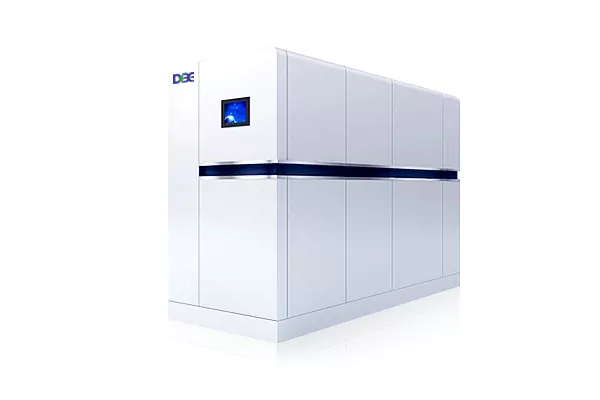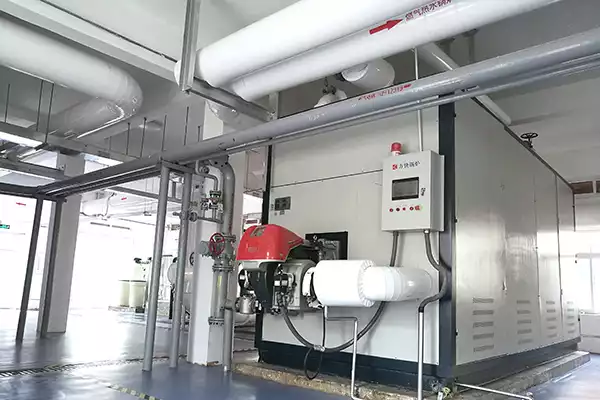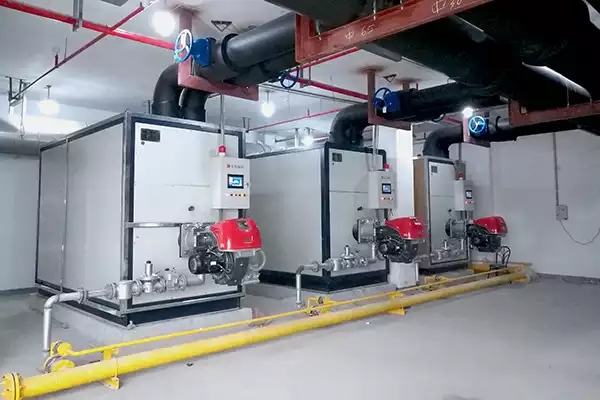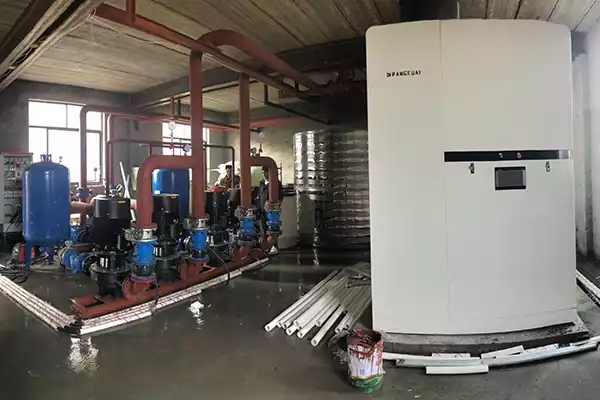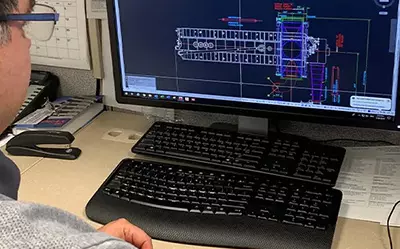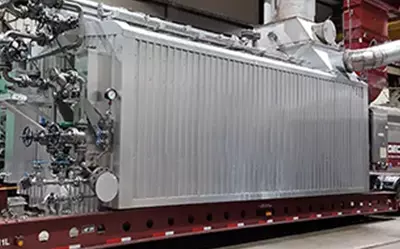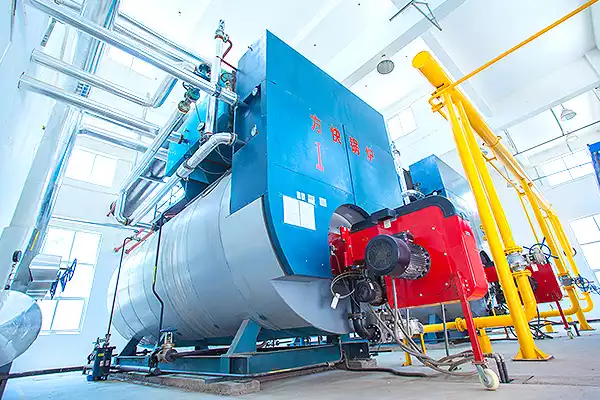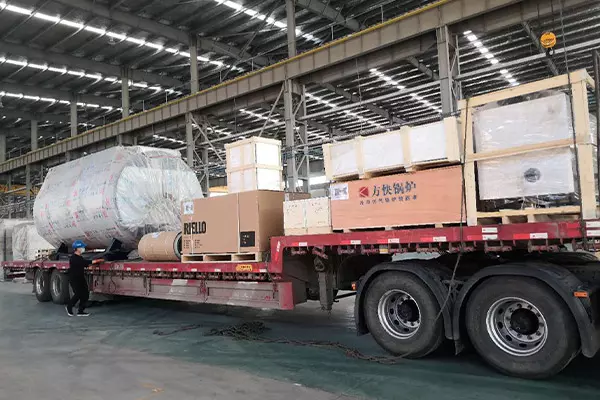An oil combi boiler is a type of heating system that uses oil as its fuel source and provides both hot water and heating for a home or building. This type of boiler is popular in areas where there is no access to natural gas, and oil is the primary fuel source.
Working principle.
An oil combi boiler works by using oil as its fuel source to heat water, which is then circulated through a central heating system to provide warmth to the home or building. Here is a more detailed explanation of how an oil combi boiler works:
- Oil is stored in a tank, which is usually located outside the home or building. The oil is then pumped into the boiler as needed.
- The oil is burned in the boiler’s combustion chamber, which creates heat that is used to heat the water.
- The heat is transferred to the water through a heat exchanger, which is a coil of pipes that runs through the boiler. As the water passes through the heat exchanger, it absorbs the heat from the combustion process.
- Once the water has been heated, it is circulated through the home or building via a network of pipes and radiators.
- As the hot water flows through the radiators, it releases heat into the room, providing warmth.
- Once the water has cooled down, it returns to the boiler to be heated again, in a continuous cycle.
Advantages and Disadvantages.
Advantages:
- Efficient: Modern oil combi boilers are highly efficient and can help reduce energy bills and carbon emissions.
- Space-saving: Combining a central heating boiler and a water heater in one unit saves space and eliminates the need for a separate water tank or cylinder.
- Convenience: Hot water is available on demand, so there is no need to wait for a tank to heat up before taking a shower or washing dishes.
- Compatibility: Oil combi boilers can be used with most types of central heating systems, including radiators, underfloor heating, and fan coils.
Disadvantages:
- Cost: Oil combi boilers are generally more expensive to install and maintain than other types of boilers.
- Fuel storage: The need to store oil in a tank can be inconvenient, and there is a risk of the tank running out of oil.
- Environmental impact: Oil is a fossil fuel and produces carbon emissions when burned, contributing to climate change.
- Carbon monoxide risk: As with any fuel-burning appliance, there is a risk of carbon monoxide poisoning if the boiler is not installed or maintained properly.
- Dependence on oil: As oil is the fuel source, the cost of heating can be affected by fluctuations in oil prices and availability. Additionally, there may be limited access to oil in certain areas.
What type of oil should I use in my oil combi boiler?
The type of oil that should be used in an oil combi boiler is usually specified by the manufacturer and can vary depending on the boiler’s design and the region in which it is used. In general, most oil combi boilers are designed to use kerosene (also known as 28-second oil or heating oil) as their primary fuel source. Kerosene is a refined oil that has a lower viscosity than other oils and is designed to burn cleanly in oil-fired heating systems.
It is important to use the correct grade of oil as specified by the manufacturer, as using the wrong type of oil can cause damage to the boiler and may affect its efficiency. Additionally, using unapproved fuels can also void the manufacturer’s warranty.
Oil Boiler vs an Combi Boiler
An oil boiler and an oil combi boiler are both types of boilers that use oil as a fuel source to heat water and provide central heating.
- Water heating: An oil boiler typically heats water that is then stored in a separate water tank or cylinder. This stored water is used for both heating and hot water needs. An oil combi boiler, on the other hand, heats water on demand, eliminating the need for a separate water tank or cylinder.
- Space requirements: As an oil combi boiler combines both a central heating boiler and a water heater in one unit, it takes up less space than a traditional oil boiler and a separate water tank.
- Efficiency: While both types of boilers can be efficient, oil combi boilers can be more efficient than oil boilers with separate water tanks. This is because oil combi boilers don’t need to heat water when it’s not needed, reducing energy waste.
- Installation: Installing an oil combi boiler can be more complex than installing a traditional oil boiler, as it requires more pipework and electrical connections. However, this can be offset by the space-saving benefits of having a single unit instead of a separate boiler and tank.
Overall, the main difference between an oil boiler and an oil combi boiler is the way in which they provide hot water. An oil boiler requires a separate water tank or cylinder, while an oil combi boiler heats water on demand, eliminating the need for a separate tank. The choice between the two will depend on factors such as space requirements, efficiency needs, and the specific heating and hot water needs of the household.
How much does an oil combi boiler cost?
These are estimated costs and can vary depending on the brand and model of the oil combi boiler, as well as installation costs. It’s always best to get a quote from a qualified heating engineer to get an accurate estimate for your specific needs. Additionally, the prices listed are in US dollars and may be subject to fluctuations in currency exchange rates.
| BTU Output | Size (kW) | Estimated Cost (USD) |
|---|---|---|
| 70,000 | 100-240 | $2,600 – $3,200 |
| 90,000 | 250-500 | $3,200 – $3,800 |
| 120,000 | 550-850 | $3,800 – $5,000 |
How do I choose an oil combi boiler?
Choosing an oil combi boiler can be a big decision, and there are several factors to consider to ensure you choose the right one for your home. Here are some key factors to consider when choosing an oil combi boiler:
- Size: The size of the boiler will depend on the size of your home, the number of occupants, and the number of bathrooms. It’s important to choose a boiler that is the right size for your needs to ensure maximum efficiency and cost-effectiveness.
- Efficiency: Look for a boiler with a high efficiency rating, such as an A-rated model, to ensure you get the most heat for your money.
- Brand and model: Choose a reputable brand and model of boiler that comes with a good warranty and has positive customer reviews.
- Cost: Consider your budget and look for a boiler that fits within your price range, while still meeting your needs.
- Installation: Make sure you choose a qualified heating engineer to install your boiler, as an improper installation can affect its performance and longevity.
- Features: Consider any additional features you may want, such as remote control or programmable settings.
- Fuel type: Choose the right type of oil for your boiler, such as kerosene or gas oil, and ensure you have a reliable and affordable supplier in your area.
By considering these factors, you can choose an oil combi boiler that is the right size, efficiency, and cost for your home, and that will provide reliable heating and hot water for years to come.
Conclusion.
The oil combi boiler is a great choice for many homes. It has been designed to work with both hot water and heating systems, making it the perfect option for anyone who wants to save money on their energy bills while still enjoying all the benefits of modern technology.
Get your best price
Quickly compare 3 FREE quotes
- Engineer quick quote
- The overall delivery speed is fast
- Financial choice
- Low installation costs and cost savings
25 years+ of boiler R&D
More than 20 innovative technologies
